#Svensk Filmindustri
Explore tagged Tumblr posts
Text
Häxam

🇸🇪 | Sep 18, 1922
directed by Benjamin Christensen
wrote by Benjamin Christensen
produced by Aljosha Production Company and Svensk Filmindustri
starring Benjamin Christensen, Ella La Cour, Emmy Schønfeld, Kate Fabian, Oscar Stribolt
1h45 | Horror, Documentary, History
𐄂 not watched
Browse through collections
Sweden Movies | director Benjamin Christensen | writer Benjamin Christensen | studio Aljosha Production Company | studio Svensk Filmindustri | actor Benjamin Christensen | actress Ella La Cour | actress Emmy Schønfeld | actor Kate Fabian | actor Oscar Stribolt
Browse through genres
Horror | Documentary | History
Credits and Links
trakt.tv | letterboxd
#Sweden Movies#Benjamin Christensen#Aljosha Production Company#Svensk Filmindustri#Ella La Cour#Emmy Schønfeld#Kate Fabian#Oscar Stribolt#Horror#Documentary#History
1 note
·
View note
Text
#kvarteret korpen#bo widerberg#1963#thommy berggren#summer interlude#sult#svält#playing for time#eraserhead#supermarkt#deutschland. ein sommermärchen#svensk filmindustri
0 notes
Text


























kvarteret korpen, bo widerberg 1963
#kvarteret korpen#bo widerberg#1963#thommy berggren#summer interlude#playing for time#eraserhead#supermarkt#material#buw#flyweight#about photography#heimspiel#boring postcards 2#deutschland. ein sommermärchen#flüstern & schreien#svensk filmindustri#adolf dresen
0 notes
Text

Greta Garbo Photographs and Clippings From Her Desk
A group of four photographs, two postcards, and six clippings regarding Greta Garbo's career. These items were found in Garbo's desk after her passing. The photographs include a black and white silver gelatin print taken on the set of The Saga of Gosta Berling (Svensk Filmindustri, 1924) and an image of Garbo as Mata Hari with her head torn from the image. The clippings are images from various publications and a partial letter from The International Who's Who requesting a revision to Garbo's entry.
66 notes
·
View notes
Text
Last week's Weekly Tag Wednesday!
Because I was festival prepping last week and had zero time for anything else but now I'm back and ready for some tags! Thank you @wehangout @mmmichyyy @michellemisfit for the tag (and also @deedala & @jrooc for the picrew tags!) <3
Name and A03 handle: lofty / loftec
Current Location: Sofa, living room.
Favorite picrew (don't have one? you can skip this or do this one)? I can't remember if I have a favourite one, so I'll just do this one!

The "SF" probably stands for something, but I immediately thought of Svensk Filmindustri and thought that was fun.
What's one thing you want in a picrew?
MORE GLASSES OPTIONS omg please. Colour and shape. I also really love it when I can build the hair in sections so I can colour my roots differently than the rest of the hair. Also, worse hair options. Come on, normalise 'I've got no hair texture or interest or time to do anything about it'. I feel like an imposter whenever I pick one of these perfectly swooshy dos.
Favourite thing you’ve created (or seen created) for the fandom?
None the wiser
Why is it your favourite? It's mad to think about but it was the first thing I decided to make for this fandom, and I'm still working on it (very very slowly) I don't know if I've ever spent this much time and effort on anything else. It's very special to me.
Did it come easily or was it hard to create? Both, right now it's very hard, but it usually comes back around.
Last ao3 fic you commented on? A Dead Boy Detectives fic, I'm pretty sure.
Biggest WIP heartache you’ve ever experienced? I'm embarrassed to admit that I don't usually read WIPs, not really because they're unfinished but because I don't often read long fic lol. My ideal fic for reading is a concise 5k oneshot, I am a terrible hypocrite.
Favorite trope or head cannon you like included in a fanfic? I do love a good outside perspective on Ian and Mickey's relationship not fully getting their dynamic and misunderstanding their special flavour of love. Also really like different canon-divergent stories where they get separated in different moments and then reunited in the future in various ways.
Least favourite? For most ships / fandoms I read fic of, I usually develop a set of icks that cause me to click out more or less immediately, often it's to do with a certain nickname or expression or act that I can't physically stand, or, you know, which signal a fundamental mismatch between mine and the author's focus/interests/views. Unfortunately, any mention of anything happening after season 5 has become a bit of an ick for me, which is deeply unfair to writers who embrace the later half of the show.
Secret or surprising kink or trope? No, I'm extremely basic tbh. My favourite time to read fic for a new fandom is always at the very start when everybody is writing the same super basic story over and over again.
Describe how you feel after you’ve created something new? The best feeling is when I know I've written the last sentence of a story or a chapter, it's always so clear that this, this is it, that's where it ends. I feel really accomplished and complete in that moment and it's great. Then there's still hours and hours of editing after that and it's usually 4 in the morning and I'm feeling slightly unhinged when I actually post.
Top hype man you have that always helps you get across the finish line: I tend to keep to myself when I'm working on something, but I can always rely on @mittimellan @wideblueskies & @the-rat-wins if I ever need to ramble about anything.
It's been a bad day, you turn to the fandom and you _____? Lurk and enjoy the good vibes and crafts. I probably also find something in my bookmarks that I've already read a thousand times and read it again.
7 notes
·
View notes
Text

Affiche suédoise du film d'Anthony Kimmins, "Mr. Denning Drives North" (Svensk Filmindustri, 1955) - Source Heritage Auctions.
7 notes
·
View notes
Text
L 182
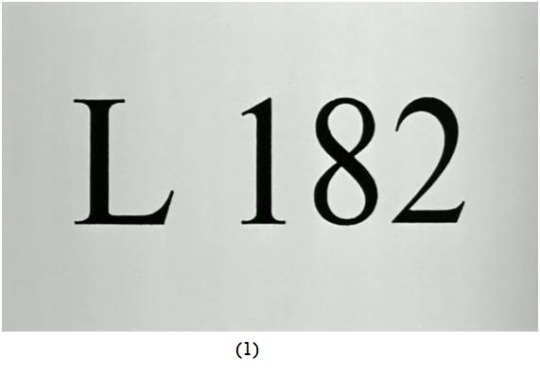
Aunque, para mi estupor perenne, no figure en las filmografías, en los libros sobre Bergman o en lo que la pereza ha convertido en mayoritaria obra de referencia y consulta mundial (IMDb), éste (1) es el único título verdadero (en la claqueta (7) se lee, manuscrito con tiza) de la película conocida, según los países, como "En passion", "Pasión" o "The Passion of Anna" y otros "alias" que nunca han gozado de un cartón en los títulos de crédito originales, sino que suelen aparecer, fantasmalmente, como subtítulos de "L 182"... o de la nada, cuando de la copia se han suprimido los fotogramas inmediatamente precedentes al letrero "En film av Ingmar Bergman", "un film de Ingmar Bergman" (como sucede en (2), extraída de mi copia en DVD).
Así es como la vi por vez primera, en el Festival de Valladolid, y la he visto cada vez que he encontrado una copia no mutilada (en algunas, como la inglesa, han sido cortados planos importantes, con la excusa de que mostraban - obviamente, ya que es uno de los temas que aborda - crueldad con animales... que parece importar más a algunos que la sufrida por seres humanos).
Si insisto en este “detalle” no es por manía historiográfica ni por obsesión de precisión filmográfica, aunque también, sino porque pienso que altera la visión de la película y dice algo acerca de Bergman, por un lado, y de los distribuidores y demás mercaderes del cine, por otro. No es lo mismo enfrentarse con algo cuyo título es una mera matrícula, el largometraje 182 de la Svensk Filmindustri (no sé contando a partir de cuándo, y no he visto otra de Bergman ni de la SF que lo indique), variante despersonalizada del aún reciente (seis años) "Otto e mezzo" de Federico Fellini, sobre todo siendo - como es - una película que se presenta abiertamente como tal, y no como un fragmento de realidad, que con una que, en abstracto, indeterminadamente, o determinada y singularizada arbitrariamente (de padecer alguien en la película, ¿por qué no Eva, o Andreas, o sobre todo el secundario Johan, o incluso Elis?), evoca de nuevo la tendencia contenutista y el aprovechamiento ideológico doloso de los que ha sido víctima, desde 1956, el cine de Bergman, convertido en “religioso” (y en España hasta en “católico”, lo que ya tiene bemoles) o, cuando menos, englobado en la línea jesuítica marcada por Paul Schrader en un libro misteriosamente célebre (y que encuentro francamente infumable), en “trascendental” o “trascendente” (en cualquier caso, “serio e importante”).
No es que "L 182" sea una película violentamente – como birriosamente se dice ahora - “deconstructiva”, seguramente no es tan “radical” y “contestataria” como otras y como muchos (¡justo tras Mayo del 68!) hubieran deseado o hasta (los más fatuos) exigido (¿con qué derecho?), pero digamos que continúa y prolonga una tendencia autoreflexiva y distanciadora (aunque no por ello necesariamente “brechtiana”), reciente y progresivamente afianzada en Bergman después de la celebrada “trilogía”, precisamente desde la muy subvalorada "För att inte tala om alla dessa kvinnor (Esas mujeres, 1964)" y hasta ese momento ilustrada, en grados diversos, por "Persona (1966)", "Vargtimmen (La hora del lobo, 1967)" y "Skammen (La vergüenza, 1968)". Es decir, que el Bergman de esos años - en una de esas impresionantes series de obras maestras con las que a veces nos sorprenden los grandes maestros - ha abandonado el clasicismo (austero o barroco, según el caso) de años anteriores y ha dejado de presentarse como un registro transparente y continuado de una parte de la realidad, estructurado en forma de historia o de pieza de teatro. Desde el punto de vista de una supuesta (¿y fijada por quién?) ortodoxia narrativa, Bergman pasa de gran narrador y dramaturgo a deficiente e ineficaz en ambos terrenos. Es como si Bergman hubiera perdido (además de, supuestamente, la fe) la confianza en sí mismo y dudase.
Esta permanente inseguridad, vacilación, interrogación, que puede desconcertar y decepcionar a algunos, a mí me merece todos los respetos, pues veo como evidente que no es una pose “modernista” ni está motivada por el oportunismo (a menudo agresivo para el espectador) tan extendido en aquellas fechas, y además la encuentro tan comprensible (si no ineludible) como interesante. No ha sido Bergman nunca (en sus declaraciones) un “fan” de Godard - más bien al contrario -, mientras que Godard sí era un admirador confeso de Bergman por lo menos desde 1958 (su artículo "Bergmanorama" sigue siendo interesantísimo y hasta profético), pero el caso es que precisamente en estos años los respectivos cines de ambos se acercan, en lo que yo tendería a considerar un proceso de influencia mutua y recíproca, dijera lo que dijera Bergman. Detecto también otras dos influencias básicas en este Bergman se diría que involuntariamente “moderno”, una reconocida, la de Luis Buñuel, y otra tan silenciada como evidente, la de Alfred Hitchcock (veo en "L 182" citas de "Psycho", "The Birds" y "Marnie"). Bueno, y el cierre de la película – aunque con antecedentes muy remotos en la filmografía del propio Bergman – parece evidentemente sugerido por "Wavelength (1966-7)" de Michael Snow (no deja de ser significativo que lo que a ciertos vanguardistas les ocupa toda una película, a Bergman o Antonioni les dé para un plano o una escena como mucho).
Creo que podría organizarse una especie de interesante ciclo retrospectivo con algunas obras de los años 60 de Hitchcock, Buñuel, Bresson, Rossellini, Bergman, Antonioni, Godard y Rivette que permitirían descubrir curiosas afinidades y tal vez ocultas influencias, ciclo que, me temo, resultaría hoy tan revelador como deprimente, ya que la mayor parte de las películas, que entonces se produjeron y estrenaron con normalidad, hoy serían irrealizables y, en todo caso, inestrenables, lo que reafirma la múltiple sensación de caminar hacia atrás, hacia el pasado, en sentido opuesto al que siempre se consideró el curso de la historia, que se observa ya en otros muchos terrenos, más vastos que el cine.
Esa interrogación bergmaniana se detecta ya a los pocos minutos, cuando una voz en off – no casualmente la suya – presenta al personaje en el que parece centrarse la película, Andreas Winkelman, y se hace brusca y brevemente manifiesta cuando el actor (Max Von Sydow) que lo encarna habla de él y de la dificultad que supone representarlo. Este proceso se repite otras tres veces, con los otros personajes fundamentales. Es algo que hoy resulta impensable, pero entonces apenas sorprendía levemente. Bergman consigue, además, mantener la tensión pese a esas rupturas de la homogeneidad dramática, e incluso crear, mediante brutales elipsis, una suerte de suspense adicional, no ya sobre los personajes, sino sobre la película misma.
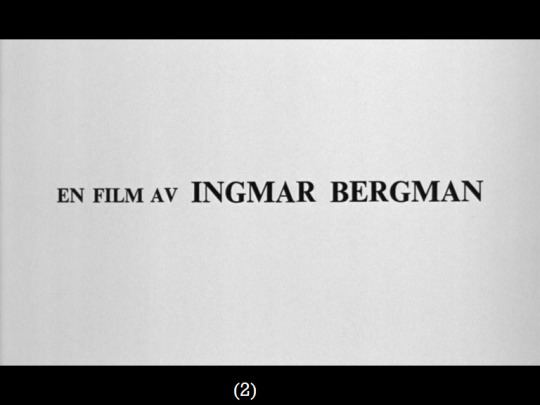
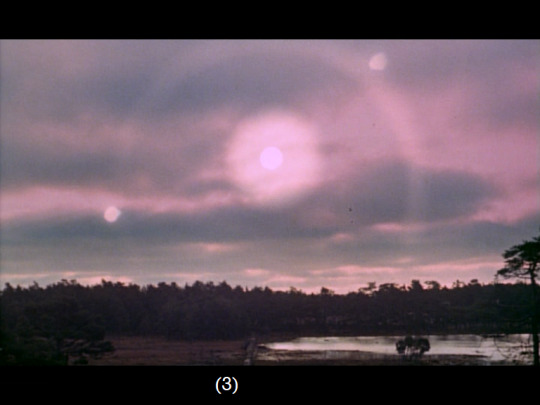
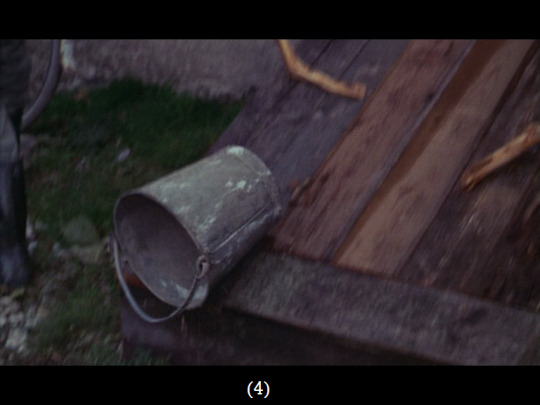

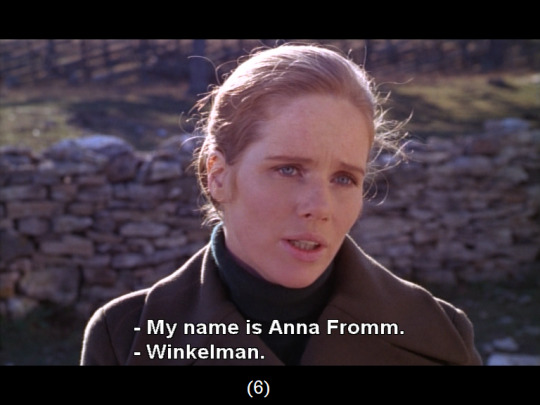


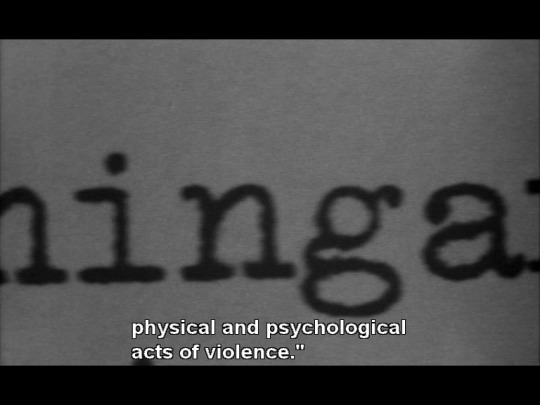

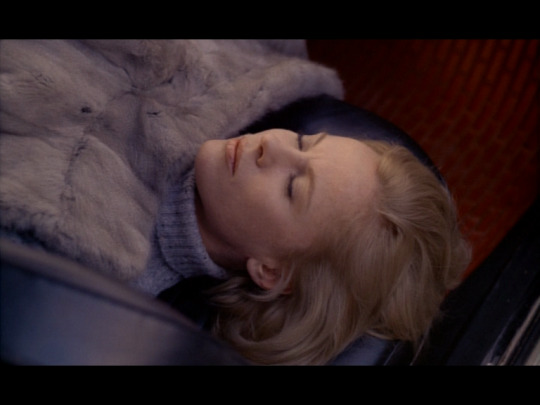
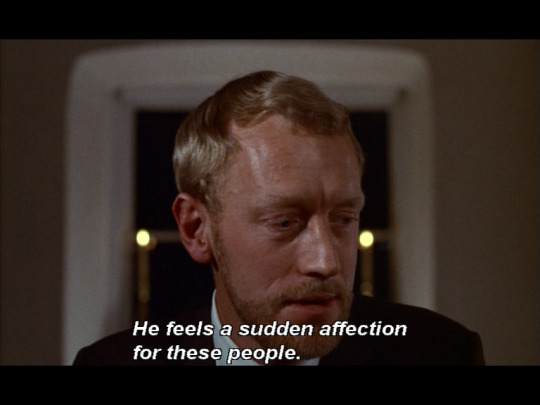
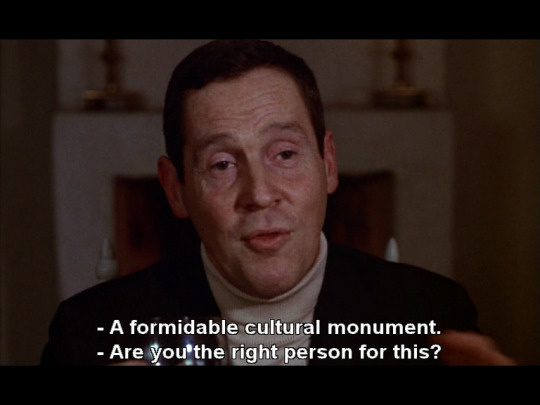

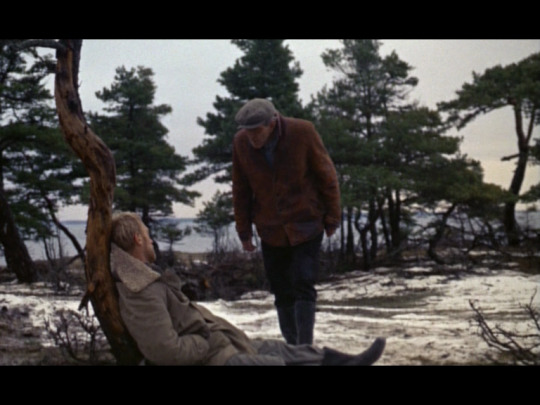

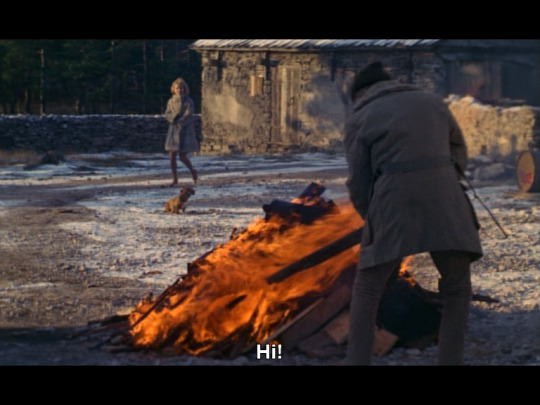
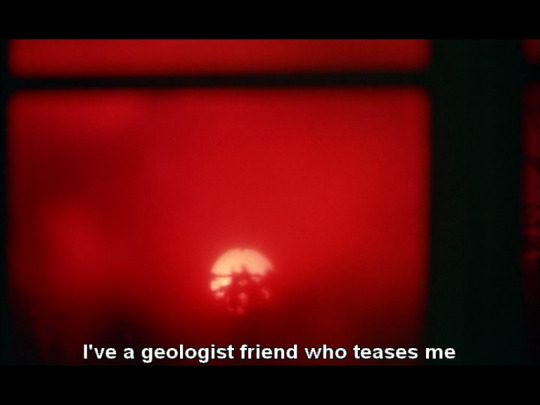
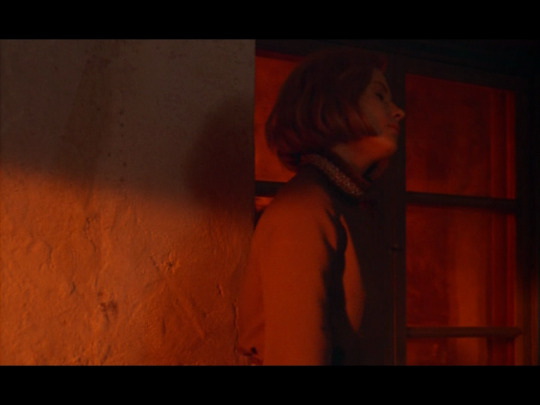

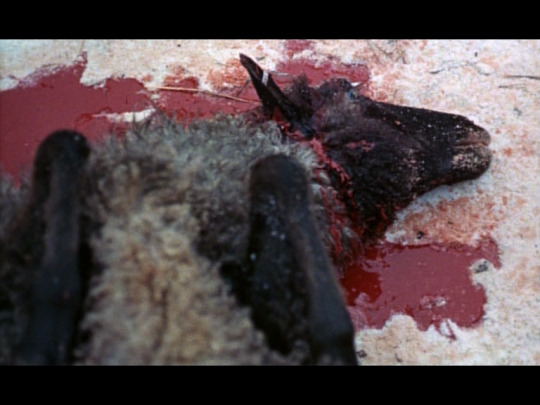


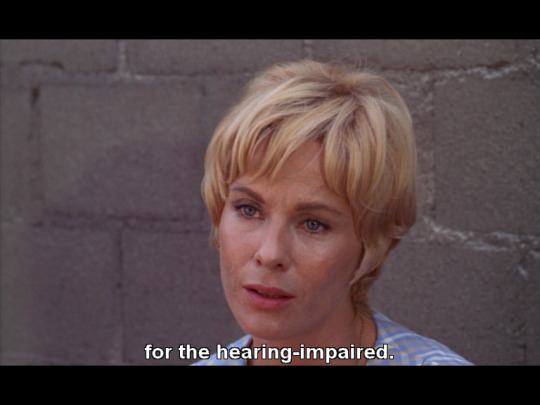
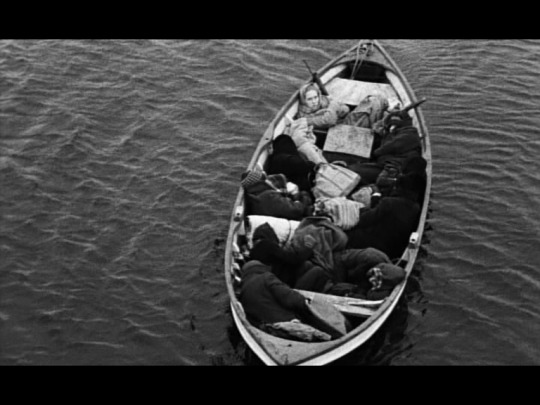
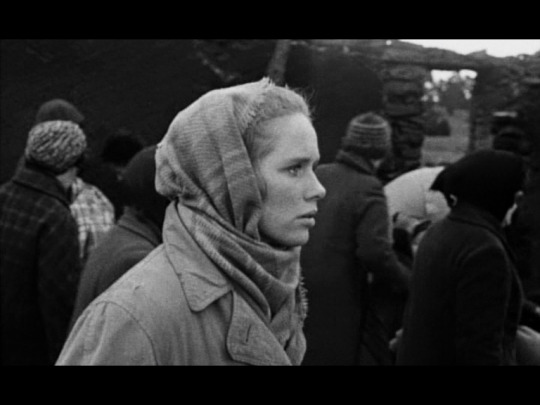
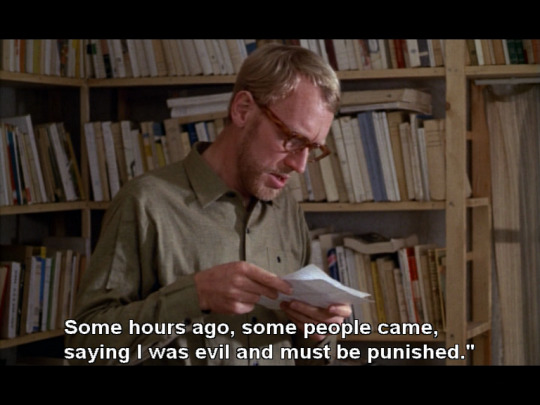
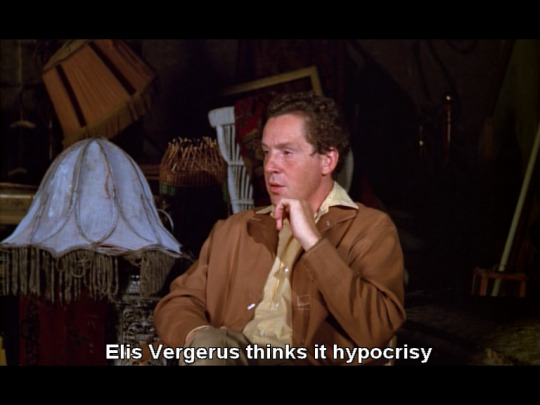
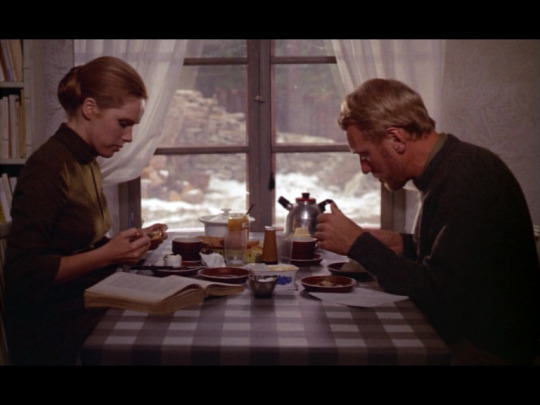




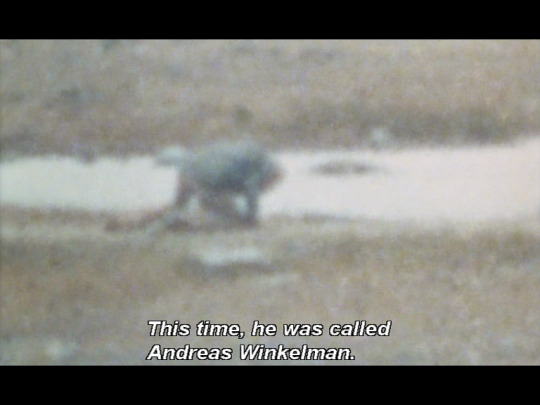
Publicado originalmente aquí: http://postcefalu.blogspot.com/2013/06/l-182.html
2 notes
·
View notes
Text

Hallowatch 2024 is over. It always makes me sad when October ends, but I'll be here next year to do it all again. Hope y'all enjoyed it and Happy Halloweeeeeen.
#1: Bimbo's Initiation. (1931). Directed by Dave Fleischer and Grim Natwick. United States: Fleischer Studios.
#2: Friday the 13th: Part 2. (1981). Directed by Steve Miner. United States: Georgetown Productions Inc.
#3: Butterfly Kisses. (2018). Directed by Erik Kristopher Myers. United States: Four-Fingered Films, and Cyfuno Ventures.
#4: What We Do In The Shadows. (2019). FX.
#5: Attack the Block. (2011). Directed by Joe Cornish. United Kingdom: StudioCanal, Film4, UK Film Council, and Big Talk Pictures.
#6: Friday the 13th Part VI: Jason Lives. (1986). Directed by Tom McLoughlin. United States: Terror, Inc.
#7: The Legend of the 7 Golden Vampires. (1974). Directed by Joe Ward Baker and Chang Cheh. United Kingdom and Hong Kong: Hammer Film Productions, and Shaw Brothers Studio.
#8: Scooby-Doo on Zombie Island. (1998). Directed by Jim Stenstrum. United States: Hanna-Barbera Cartoons, Warner Bros. Animation, and Warner Bros. Family Entertainment.
#9: Jason Goes to Hell: The Final Friday. (1993). Directed by Adam Marcus. United States: New Line Cinema.
#10: In A Violent Nature. (2024). Directed by Chris Nash. Canada: Shudder Films, Zygote Productions, and Low Sky Productions.
#11: It's Alive. (1974). Directed by Larry Cohen. United States: Larco Productions.
#12: Scanners. (1981). Directed by David Cronenberg. Canada: Filmplan International.
#13: Mandy. (2018). Directed by Panos Cosmatos. United States: SpectreVision, Umedia, and XYZ Films.
#14: My Bloody Valentine. (1981). Directed by George Mihalka. Canada: Canadian Film Development Corporation, and Secret Film Society.
#15: Deathgasm. (2015). Directed by Jason Lei Howden. New Zealand: MPI Media Group, New Zealand Film Commission, and Timpson Films.
#16: The Tunnel. (2011). Directed by Carlo Ledesma. Australia: Distracted Media, Zapruder's Other Films, and DLSHS Film.
#17: The Shrine. (2010). Directed by John Knautz. Canada: Brookstreet Pictures.
#18: No One Will Save You. (2023). Directed by Brian Duffield. United States: 20th Century Studios, and Star Thrower Entertainment.
#19: The Block Island Sound. (2020). Directed by Kevin and Matthew McManus. United States: 30 Bones Cinema, Hood River Entertainment, Captain Inertia Productions, and Title Media.
#20: It Follows. (2014). Directed by David Robert Mitchell. United States: Northern Lights Films, Animal Kingdom, and Two Flints.
#21: Too Many Cooks. (2014). Directed by Casper Kelly. United States: Fake Wood Wallpaper Films, Animation Inc, and Williams Street.
#22: Village of the Damned. (1960). Directed by Wolf Rilla. United Kingdom and United States: Metro-Goldwyn-Mayer.
#23: The Bloodening. (???) Directed by ???. United Kingdom: ???
#24: House. (1977). Directed by Nobuhiko Obayashi. Japan: Toho Eizo.
#25: The Doll's Revenge. (1907). Directed by Cecil M. Hepworth. United Kingdom: Hepworth Manufacturing Co.
#26: SOMA. (2015). Sweden: Frictional Games.
#27: El Orfanato (aka The Orphanage). (2007). Directed by J. A. Bayona. Spain and Mexico: Rodar y Rodar, and Telecinco Cinema.
#28: Psychomania (aka The Death Wheelers). (1973). Directed by Don Sharp. United Kingdom: Benmar Productions.
#29: The People Under the Stairs. (1991). Directed by Wes Craven. United States: Alive Films.
#30: The Collector. (2009). Directed by Marcus Dunstan. United States: LD Entertainment, Fortress Features, and Imaginarium Entertainment Group.
#31: Häxan. (1922). Directed by Benjamin Christensen. Sweden: Svensk Filmindustri.
0 notes
Text
Halloween Horror Movie Review: Häxan (1922)
Title: Häxan (The Witches) Release Date: 18 September 1922 Director: Benjamin Christensen Production Company: Svensk Filmindustri Synopsis (via Letterboxd): Grave robbing, torture, possessed nuns, and a satanic Sabbath: Benjamin Christensen’s legendary film uses a series of dramatic vignettes to explore the scientific hypothesis that the witches of the Middle Ages suffered the same hysteria as…

View On WordPress
0 notes
Text
Один из чудеснейших образцов редкого кинематографического жанра «безумных биографий» - шведская сюрреалистическая сага о вымышленной жизни Пабло Пикассо (уже само сочетание этих ингридиентов вызывает легкий приступ веселья) - наполнен задорным смехом в лучших традициях сатирических кинопародий. Неистовый фарс разыгран актерами, внешне похожими на исторических персонажей - Пикассо, Дали, Аполлинера, Гертруду Стайн и Алису Б. Токлас (причем двух последних сыграли мужчины). Оригинальная идея фильма пришла в голову актеру Гёсте Экману. Он придумал, что было бы забавно написать путеводитель по местам, где никогда не был. Далее эта мысль получила свое развитие: придумать биографию человека, которого никогда не встречал. Скажем, биографию знаменитости: Иисуса или Пикассо. За дело взялись сценаристы Таге Даниэльссон и Ханс Альфредсон. В фильме говорят на 10 языках: шведском, английском, немецком, испанском, латинском, русском, итальянском, французском, финском и норвежском. Закадровое повествование ведется на шведском языке, а сами эпизоды разыгрываются на одном из «иностранных» языков, причем смысл произносимых фраз совершенно иной, чем этого требует ситуация того или иного эпизода, а подчас этого смысла вообще нет, что придает фильму особую комичность. Есть в фильме и режиссерское камео: Таге Даниэльссон сидит в театре позади Пикассо с большими рыжими усами. Мадрид, Париж и Нью Йорк были сняты на одной улице маленького шведского городка Томелилла в провинции Скона. Большая часть картины была снята в его окрестностях. Шведская национальная кинопремия «Золотой жук», Стокгольм, 1978. Лучший фильм года.
комедия #абсурд #гротеск
Выпущено: Швеция, Svensk Filmindustri (SF) AB, Svenska Ord Режиссер: Таге Даниэльссон В ролях: Ханс Альфредсон, Маргрета Кроок, Гёста Екман, Биргитта Андерссон, Пер Оскарссон, Свен Линдберг, Лена Олин, Бернард Криббинс, Уилфрид Брамбелл, Лена Нюман, Лассе Пёвсти
Перевод: Любительский одноголосый
0 notes
Text

200 Films of 1952
Film number 160: Secrets of Women (Kvinnors Väntan)
Release date: November 3rd, 1952
Studio: AB Svensk Filmindustri
Genre: drama
Director: Ingmar Bergman
Producer: Allan Ekelund
Actors: Anit Björk, Eva Dahlbeck, Maj-Britt Nilsson, Birger Malmsten, Gunnar Björnstrand
Plot summary: Four sisters-in-law wait in a summer house for their husbands to arrive. As they sit around a table, each sister confesses a bit about her relationship with her husband. Everything from infidelity, having a child out of wedlock, and sexy escapades are discussed.
My rating (out of 5 stars): ****¼
In my college days Bergman was one of my very favorite filmmakers, and I’ve seen most of his films. As I’ve gotten a little older, I don’t desire to watch such heavy angsty movies as much, so it’s been quite a while since I’ve seen one. Even though it’s not a masterpiece like my favorites Persona, Winter Light, or The Silence, I still enjoyed it quite a bit. It actually wasn’t as heavy as the above films- some parts of it were almost like a romantic comedy! The setup was interesting, and with any Bergman movie, the acting was nearly perfect. (Minor spoilers)
The Good:
Like many Bergman films, this puts the focus on women- their relationships, their emotions, their trauma... In Hollywood at this time (and even today!) films that are this focused on women are more niche “women’s films,” and they tend to be taken less seriously. I like that Bergman’s are just considered great films in their own right.
All of the acting was very good. If you are in a Bergman film, you must be comfortable with and adept at closeups, and each actress in this certainly was.
The aforementioned close-ups! A big part of Bergman’s style was filling the screen with a character’s face. That way we get to see the smallest movements and changes in the eyes. Like Kurosawa in Japan, highlighting non-verbal communication more than spoken language gives us deeper insight into the characters.
This never spoon-fed the audience information.
Bergman's films are also much freer to show things Hollywood steered clear of because of the Production Code. Things like infidelity, sex, and pregnancy outside of marriage are all directly addressed, and importantly, characters who commit these behaviors are not required to be punished for them. This film is a perfect example.
This was a much more sensual film than most Hollywood fare. It’s easily one of the most sensual on my list so far, which has been 160 films!
I enjoyed the third story between Karin and Fredrik the most. Even though it was the lightest in tone of the three, it was really well acted, engaging, and sexy to boot.
I love Gunnar Björnstrand! He’s my favorite recurring male actor of Bergman’s.
I also loved Eva Dahlbeck as Karin. She was a great actress, and the camera loved her. Absolutely stunning.
I liked the way Maj’s story ended things. She was a teenager about to marry and run off with her boyfriend Henrik. After listening to all of the adult women talk of complications, heartache, and troubles in marriages, she, as a typical youngster, firmly believes that she and Henrik will never be like that.
The Bad:
Any time a movie has this kind of multiple story framework, there are some limitations. There just isn’t enough time to fully flesh out each woman’s account of things. This film did an impressive job working within those limitations, but they were there, nonetheless.
The second story was the longest and the least effective for me. Something about it just didn’t gel in an emotional way. It wasn’t bad, and I still enjoyed watching it, but it was my least favorite.
Why didn’t we get more of Annette’s story? I would have liked to hear it, despite her insistence that there was nothing to say about her boring and emotionally unfulfilling marriage.
1 note
·
View note
Text










BODIES ARE ONLY USEFUL TO HOUSE A GHOST — A STUDY ON THE SYNDICATE'S GHOST i know i'm like a ghost ; i have nothing but myself
crush , hannah cohen / faces in the crowd , valeria luiselli / ghosts of right now , dillon samuelson / unknown / hannibal , bryan fuller / the beforelife : poems ; empty stage , franz wright / unknown / unknown / ansiktet ( svensk filmindustri ) , ingmar bergman / this way to the sugar , hieu minh nguyen
#ii. ( study ) : you are an amalgamation of all the faces looking back at you#i. ( edit ) : what happens to anything beautiful
0 notes
Text
Primeiro roteiro de Bergman confronta autoritarismos
Em 1942, Ingmar Bergman foi contratado como “roteirista escravo” pela SF (Svensk Filmindustri), onde, junto com outros colegas, lia, comentava e reescrevia roteiros para o estúdio de cinema sueco. Ingmar Bergman Fiquei doente no verão seguinte à minha formatura (1937) e foi então que tive a ideia de TORTURA DE UM DESEJO. Escrevi o roteiro sem pausa num antigo caderno de latim meio usado. A…

View On WordPress
1 note
·
View note
Photo

Urho Somersalmi and Lil Dagover in 'Hans engelska fru'. © AB Svensk Filmindustri (1927). Photo courtesy of the Swedish Film Institute Library.
#urho somersalmi#lil dagover#hans engelska fru#svensk filmindustri#1927#swedish film institute library#Isepa AB#swedish silent cinema
41 notes
·
View notes
Photo
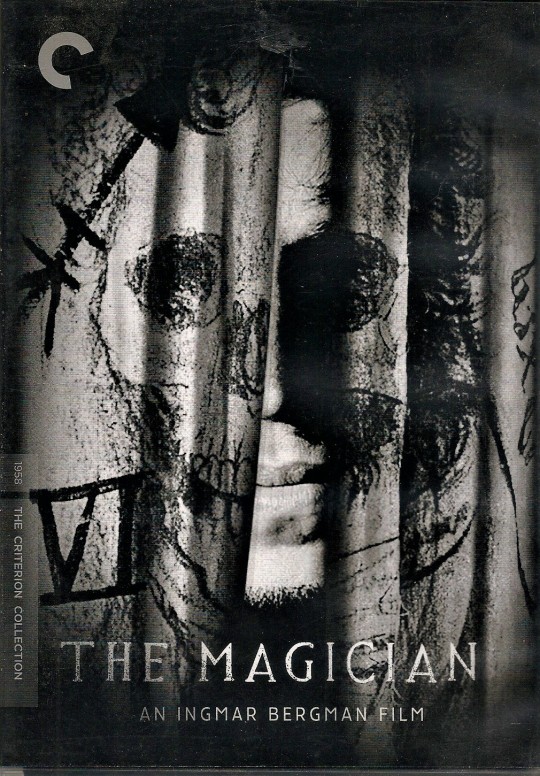
Bad movie I have The Magician 1958 aka Ansiktet and The Face
#The Magician#Svensk Filmindustri#Max von Sydow#Ingrid Thulin#Gunnar Björnstrand#Naima Wifstrand#Bengt Ekerot#Bibi Andersson#Gertrud Fridh#Lars Ekborg#Toivo Pawlo#Erland Josephson#Åke Fridell#Sif Ruud#Oscar Ljung#Ulla Sjöblom#Axel Düberg#Birgitta Pettersson#Frithiof Bjärne#Tor Borong#Arne Martensson#Harry Schein
5 notes
·
View notes
Photo

2 notes
·
View notes